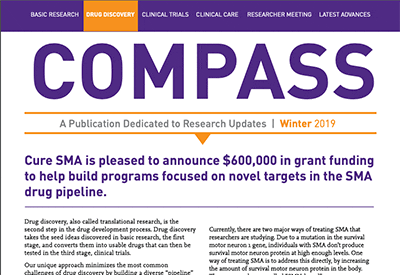Scholar Rock today announced positive interim results from the ongoing Phase 1 single- and multiple-ascending dose clinical trial of SRK-015 in healthy adult volunteers. SRK-015, a highly specific inhibitor of myostatin activation, was observed to be well tolerated with no apparent safety signals. By demonstrating robust and sustained target engagement in humans, pharmacologic effects on serum concentrations of latent myostatin show initial proof-of-mechanism for this therapeutic approach. These Phase 1 results, support movement of SRK-015 to a Phase 2 proof-of-concept clinical trial in patients with spinal muscular atrophy, evaluating a once every four-week dosing regimen.
Phase 1 Trial Design and Interim Results
The randomized, double-blind, placebo-controlled Phase 1 clinical trial was designed to evaluate the safety and tolerability of intravenously administered SRK-015, assess the PK/PD profile, and inform dosing for the Phase 2 trial.
Single-Ascending Dose (SAD): Enrolled 40 adult healthy volunteers, randomized 3:1 to receive a single dose of SRK-015 or placebo, and evaluated doses of 1, 3, 10, 20 and 30 mg/kg.
Multiple-Ascending Dose (MAD): Enrolled 26 adult healthy volunteers, randomized 3:1 to receive SRK-015 or placebo every two weeks for a total of three doses (Day 0, 14 and 28). The MAD portion of the trial evaluated doses of 10, 20 and 30 mg/kg.
The interim analysis was conducted with data from all subjects in the completed SAD portion of the trial and available data for all subjects in the MAD portion of the trial, including through Day 35 for the highest 30 mg/kg dose cohort and longer follow-up for the 10 and 20 mg/kg dose cohorts. Follow-up in the MAD portion of the trial is ongoing and full clinical results from the Phase 1 trial will be presented at a scientific conference this year. SRK-015 was observed to be well tolerated with no dose-limiting toxicities identified up to the highest evaluated dose of 30 mg/kg.
Phase 2 (TOPAZ) Trial Overview
Scholar Rock’s preclinical data and translational insights highlight the promising potential of myostatin as a drug target in SMA, and positive interim results from the Phase 1 study demonstrate that SRK-015 may have the necessary pharmacologic profile to modulate this pathway.
Scholar Rock plans to initiate a Phase 2 proof-of-concept clinical trial to assess the safety and efficacy of SRK-015 in patients with Type 2 and Type 3 SMA by the end of the first quarter of 2019. The trial will include three cohorts, each representing a distinct subpopulation of patients. A total of 50-60 patients are planned to be enrolled in the Phase 2 trial and all patients will receive SRK-015 dosed once every four weeks (Q4W) either as a monotherapy or in conjunction with an approved SMN upregulating therapy. The primary efficacy endpoints will measure motor function through clinically meaningful outcome measures validated in SMA, such as the Hammersmith Functional Motor Scale Expanded (HFMSE) in non-ambulatory SMA and the Revised Hammersmith Scale (RHS) in ambulatory SMA, over a 12-month treatment period. Scholar Rock plans to provide additional details on the trial design at the time of initiating patient dosing in the second quarter of 2019.
An interim analysis assessing safety and efficacy is planned for each cohort of the Phase 2 trial, encompassing a subset of patients with at least 6 months of treatment exposure. These interim results by cohort are expected in the first half of 2020. Top-line results for the full 12-month treatment period are expected starting in the fourth quarter of 2020 and through the first quarter of 2021. In addition, analyses of preliminary PK and PD data are planned by the end of 2019.
About SRK-015
SRK-015 works by inhibiting myostatin. Myostatin is a protein that works with other proteins and hormones to help regulate muscle mass. In healthy individuals, myostatin limits muscle growth and differentiation, to prevent muscles from growing too large. For individuals affected by SMA, inhibiting this protein may combat the muscle weakness and atrophy that characterizes the disease. A Phase 1 clinical trial in healthy volunteers is ongoing. The U.S. Food and Drug Administration (FDA) has granted Orphan Drug Designation (ODD) for SRK-015 for the treatment of SMA.



